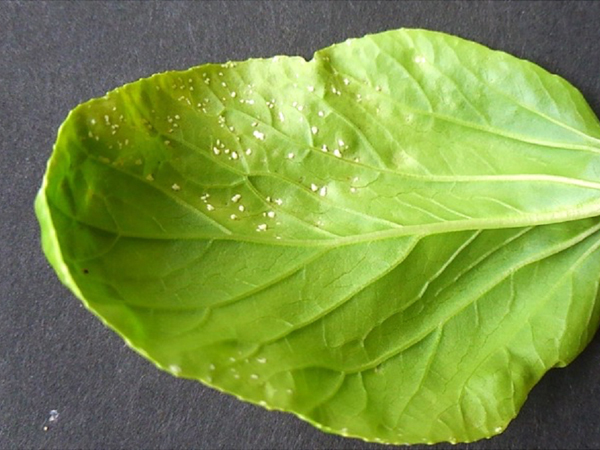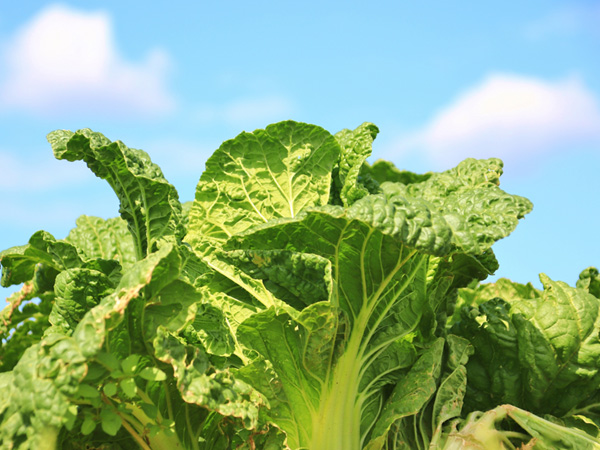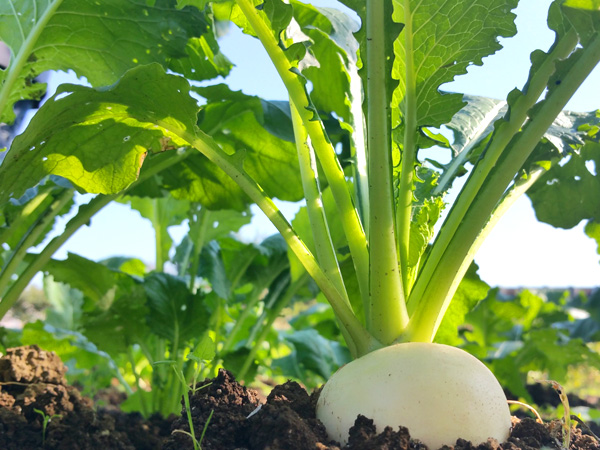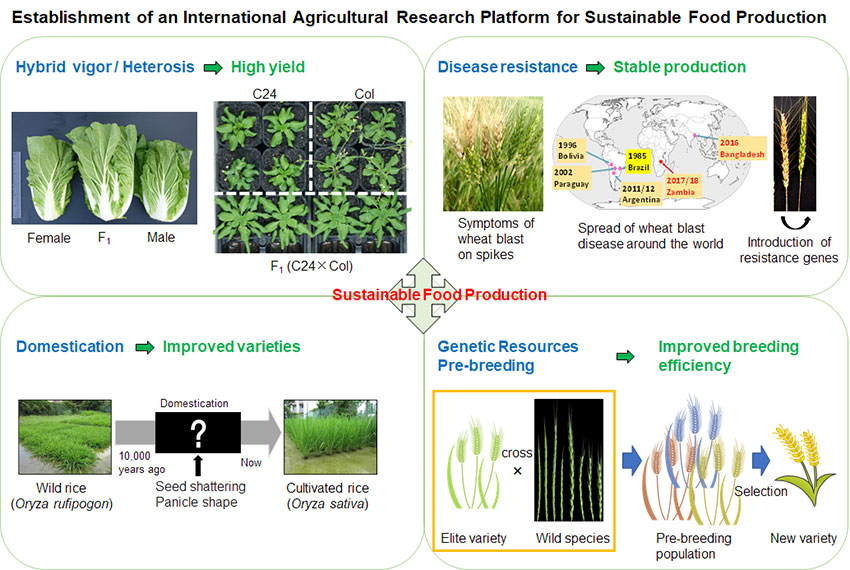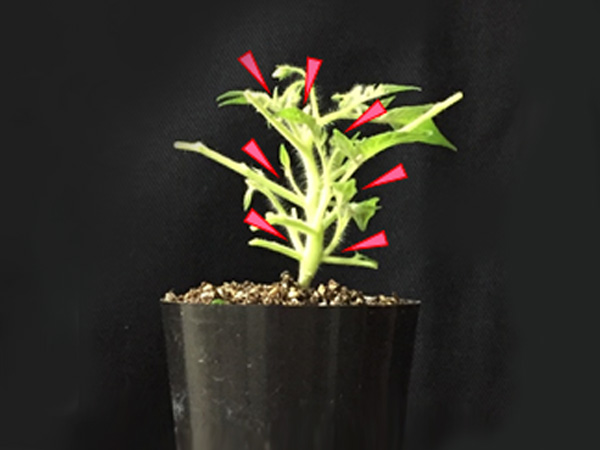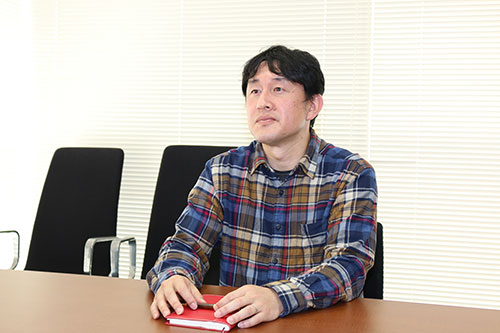
The population of Japan has started to decrease, while the world population continues to increase. The need to stabilize and expand food production is a global issue. An important theme in agricultural research how to overcome the risks facing agricultural production, such as climate change and newly emerging pests. Associate Professor FUJIMOTO Ryo, the director of an international joint research project titled “Building the Foundation for International Joint Research in Agricultural Science Aiming for Implementation of Sustainable Food Production,” talks about his career as a researcher and the significance of this project.
Studying agricultural science with a vision of social implementation
Why did you choose the field of agricultural science?
Professor Fujimoto:
In high school, I was better at biology than physics. I thought about studying biology, and considered two options: the Faculty of Agriculture or the Faculty of Science. I chose the Faculty of Agriculture since I thought my studies would be more closely related to practical applications and social implementation. Later on, I became fascinated by the research style of the Faculty of Science, which conducts fundamental research. At Tohoku University’s Faculty of Agriculture, students choose their department after enrolling. I decided to major in the study of plant breeding as many students there were interested in environmental problems, and I wanted to work on issues such as desert greening. Desert greening still remains a potential research theme for the future.
What made you want to be a researcher instead of getting a job at a company or in an administrative office?
Prof. Fujimoto:
In my last year as an undergraduate, I joined a laboratory where students actively conducted research. I became absorbed in my studies and continued on to the Master’s Program. Around this time, I began to enjoy research and thought that I would like to continue to do this. Also, if you apply for jobs with a Master’s Degree, the prospective employers evaluate you on aspects such as communication skills. These aspects were unrelated to the outcome of my studies, so I thought I wouldn’t feel rewarded unless I got a job based on my research. So, I decided to continue on to the Doctoral Program. Not applying for jobs when I was a Master’s student paved the path to becoming a researcher. At that time, companies rarely hired students with doctoral degrees.
Wide-ranging research from basic to applied
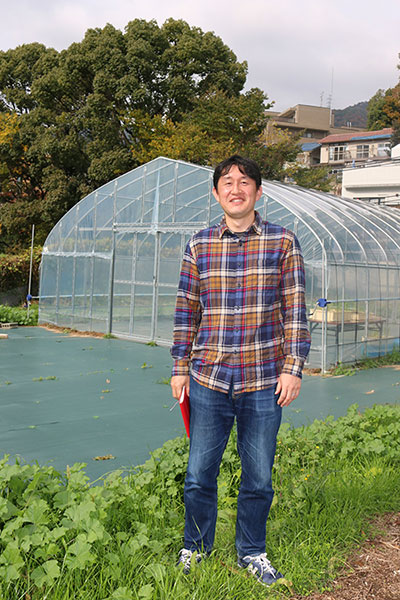
What kind of studies have you worked on?
Prof. Fujimoto:
Beginning in my last year as an undergraduate and throughout the Doctoral Program, I studied self‐incompatibility in Brassicaceae. The pistils of Brassicaceae such as Chinese cabbage are not fertilized by their own pollen. They are pollinated by pollen from other plants carried by insects or other carriers. This phenomenon is called “self‐incompatibility” and is thought to maintain genetic diversity. My research examined how pistils recognize the difference between their own pollen and that of other plants, and to understand why this phenomenon occurs at the molecular level.
Through this research, I became interested in epigenetics, which is the expression of different traits from the same DNA sequence of a gene. I found the research style of the Faculty of Science fascinating when I conducted fundamental research on epigenetics in collaboration with pioneers in the research field at the National Institute of Genetics in Shizuoka. Then at the Commonwealth Scientific and Industrial Research Organisation (CSIRO) in Australia, I started studying heterosis, a phenomenon in which the first filial generation obtained by crossing the same species shows traits superior to both parents. At Niigata University, where I started working after returning to Japan, I researched plant disease resistance and vernalization, which is a process that determines the timing of flowering, and heterosis.
My post-Australia research has rekindled my passion for studying agricultural science as it is connected to social implementation. My work ranges from basic to applied research, utilizing my experience in fundamental research on the genetic level.
What research theme are you currently working on?
Prof. Fujimoto:
I’m currently studying heterosis. This phenomenon helps to increase plant yield. Although it is commonly observed in a variety of species, including animals, its molecular mechanism has yet to be understood. I’m working on molecular biology research as well as “molecular breeding” of Brassicaceae, which I have been investigating since I was a student. My research aims to select better candidate at the DNA level by identifying genes related to traits such as shape, yield, and disease resistance, which are important for selective breeding. Creating DNA markers will contribute to optimized and faster breeding.
Contributing to selective breeding by unraveling the genetic mechanism
What is the topic and aim of your international joint research project?
Prof. Fujimoto:
Selective breeding is necessary to make stable production possible amidst global warming and to address the increased food demands of a growing world population. We aim to selectively breed varieties that meet the needs not only of Japan but of the world. Our main research themes cover four areas: unraveling the molecular mechanism of heterosis and stabilizing food production; unraveling genetic changes from wild rice to cultivated rice and increasing the yield; breeding resistant varieties to prevent the spread of wheat blast fungus; and selective breeding by introducing useful genes from wild species, which is known as pre-breeding from genetic resources.
Developing new varieties with increased yield requires about 10 years of selective breeding through generations and is generally conducted at seed companies, research institutions, or agricultural experiment stations. It is hard for a university to do it alone. I think researchers at universities can contribute towards optimizing the variety breeding process by finding genes related to improvements (such as increased yield) and conducting DNA analysis to predict the traits to express prior to cultivation.
Wheat blast fungus is a deadly disease that may decrease the yield to almost zero. Currently, this highly pathogenic fungus has begun to prevail in Brazil and Bangladesh. If it spreads to the major regions of wheat production like Europe, it could lead to a worldwide food crisis. There are researchers here at Kobe University who have been tackling this issue since it first emerged. We explore and separate resistant genes placed inside wild rice or distantly-related gramineous plants and introduce them into practical wheat varieties to breed resistant varieties.
We aim to make stable food production a reality so that future generations can live in a famine-free world. We will achieve this by dealing with changes in the agricultural environment, such as global warming, and contribute towards selective breeding of resistant varieties.
Strengthening international presence through joint research
What is the significance of conducting joint research with almost ten countries, including Australia, Georgia, Mexico, the United Kingdom, Germany, Myanmar, Cambodia, China, and South Korea?
Prof. Fujimoto:
We hope that collaboration with brilliant researchers from around the world with similar research interests will have a synergistic effect. Georgia has a lot of genetic wheat resources, and research on wheat is very active in Germany and Mexico. Myanmar and Cambodia have plenty of wild rice varieties, which are the ancestors of cultivated rice. Anticipated outcomes include identifying novel useful genes that can be used to breed improved rice in Southeast Asia. Even today, I still collaborate on heterosis research projects in Australia, which is where I used to work. As for China and South Korea, Brassicaceae such as Chinese cabbages are being actively researched.
We received research funding from Kobe University, so we will send research fellows, including students, abroad and deepen the engagement with many researchers by meeting co-researchers. I hope that these opportunities will inspire students to become international researchers. In addition, these exchanges will likely inspire new research ideas and lead to the publication of international co-authored research articles.
Please tell us about your medium-to-long-term research goals.
Prof. Fujimoto:
I’d like to deepen my research from a global perspective. Japanese researchers tend to be underrepresented on the international stage. For example, many researchers in Japan work on Brassicaceae, which is my research subject, but few share their findings with the world. I consciously write international co-authored papers partly because I studied in Australia. I want to leverage this advantage and continue to conduct international collaborations.
As for this international project, four colleagues from the Graduate School of Agricultural Science will participate. Some are young, while others are more experienced. At the Graduate School of Agricultural Science and the Faculty of Agriculture, an open study group called “Intergenomics” has existed for more than 20 years. It mainly consists of younger research fellows and hosts seminars with prominent researchers three to four times a year. I am particularly grateful to the professors who founded Intergenomics because these gatherings and connections resulted in the formation of this study project’s team. I want to maintain strong relationships within the Graduate School.
Resume
| March 2006 | Graduated from the Department of Life Science, Graduate School of Agricultural Science, Tohoku University PhD in Agricultural Sciences |
| April 2006 – October 2008 | Doctoral Research Fellow at the National Institute of Genetics (under the Research Fellowship for Young Scientists funded by the Japan Society for the Promotion of Science, Doctoral Research Fellow at the National Institute of Genetics, Research Organization of Information and Systems) |
| November 2008 – May 2011 | Doctoral Research Fellow at CSIRO Division of Plant Industry in Australia (under the Research Fellowship for Young Scientists funded by the Japan Society for the Promotion of Science, Overseas Research Fellowships funded by the Japan Society for the Promotion of Science) |
| June 2011 – August 2013 | Assistant Professor at the Graduate School of Science and Technology, Niigata University |
| September 2013 – Present | Assistant Professor at the Graduate School of Agricultural Science, Kobe University |





